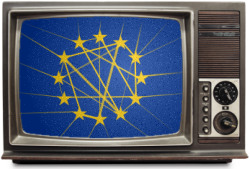Paris, 28 April 2008 – Negotiations are still going on in secret among the European Parliament, the EU Council, and the Commission on the directives of the Telecoms Package. The crucial question of “net discrimination” is being intensely and alarmingly reworked right now in the Universal Service directive, whose rapporteur is Malcolm Harbour (EPP/ED – UK). The Council is currently neutralizing every provision protecting citizens’ rights. The Parliament must react.
The question is simple, and yet puts in jeopardy the investment and innovation models of an open Internet as we know it. Should the operators be able to select what their users are able to view and use, or shall it be the users who make their own choices? Should the operators control the content and services on the Internet, or should future innovation continue to be possible for the “guys in the garage”, as today’s Internet grew and was built? In these troubled times where entertainment industries want the ability to police and regulate by themselves1As they might be about to do with the archaic French “three strikes / HADOPI” law which will give entertainment industries police powers and their own private parallel justice., the answer to this question could shape the future of Internet in Europe.
 If “net discrimination”2For a precise definition of net discrimination, see: http://www.laquadrature.net/en/who-wants-net-discrimination-in-europe. is enabled in Europe, any operator would be able to choose what goes through his pipes. They could force their clients to use their own private services by taking away their clients’ freedom to access or use Internet content, service or applications of their own choice. Such discriminatory practices would mean the end of an open, equitable, and innovative Internet. The social and economical cost of such an outcome would overwhelmingly exceed the added benefits for the operators3The operators would benefit from such scheme by relying on discrimination instead of buying bigger “pipes” when they get congested, which was the investment model key to the growth of the internet.. It would be an enormous and risky change — from an open an accessible Internet back to what existed before the Internet: a collection of private, limited, semi-closed networks.
If “net discrimination”2For a precise definition of net discrimination, see: http://www.laquadrature.net/en/who-wants-net-discrimination-in-europe. is enabled in Europe, any operator would be able to choose what goes through his pipes. They could force their clients to use their own private services by taking away their clients’ freedom to access or use Internet content, service or applications of their own choice. Such discriminatory practices would mean the end of an open, equitable, and innovative Internet. The social and economical cost of such an outcome would overwhelmingly exceed the added benefits for the operators3The operators would benefit from such scheme by relying on discrimination instead of buying bigger “pipes” when they get congested, which was the investment model key to the growth of the internet.. It would be an enormous and risky change — from an open an accessible Internet back to what existed before the Internet: a collection of private, limited, semi-closed networks.
In the latest text presented by the Council, operators may impose any limitation as long as they inform the consumer. This total freedom of providers to limit offers is particularly dangerous in markets that are prone to cartels or oligopoly. It pretends to encourage innovation and growth by restricting services in order to make consumers pay for removing those restrictions. This approach is a scam pushed by AT&T and defended by the UK network regulation authority Ofcom and the UK government. La Quadrature has published a dossier on the topic4http://www.laquadrature.net/files/LaQuadratureduNet-20090218_net_discrimination-dossier_and_proposals.pdf.. “Crucial questions of fundamental rights of EU citizens, including freedom of expression, information and education, cannot be reduced to market and competition problems. This is especially clear in how consumer and competition laws have failed to affect the restrictive and anti-competitive behaviour of mobile operators5All mobile operators in most EU countries are blocking voice-over-IP, peer-to-peer file-sharing and streaming applications on what they called ”mobile Internet”.…” explains Jérémie Zimmermann, spokesperson for La Quadrature du Net.
Provisions protecting citizens’ rights against such behaviours (article 32a6From the http://www.laquadrature.net/files/090418%20CONS_CONS(2008)16497(REV1)_EN.doc attached document, article 32a might become the following indicative recital:
1. Possible redrafting of AM 166/Art 32a as a new USD 1(3)
“3. This Directive neither mandates nor prohibits conditions imposed by providers of publicly available electronic communications and services, where allowed under national law and in conformity with Community law, limiting users’ access to and/or use of services and applications but does provide for information of such conditions. National measures regarding end-users’ access to or use of services and applications through electronic communications networks shall respect the fundamental rights and freedoms of natural persons and shall be in accordance with the objectives and principles set out in Article 8 of Directive 2002/21/EC.”, the very weak recital 26 from the Universal Service Directive, and article 8.4 (fa) from the Framework directive) were heavily modified and neutered in the Council’s latest version. The Parliament must now reaffirm its commitment to defending EU citizens, by reintroducing protective provisions against “net discrimination” in the Telecoms Package.
“This vision of discriminated networks only regulated by the market, defended by the Council in agreement with Malcolm Harbour is utterly unsatisfactory. An open and egalitarian access to the Internet is, and will be even more in the future, an issue of fundamental freedoms. The European Parliament must protect EU citizens with safeguarding amendments that would define clearly what operators may and may not do. It is essential to preserve the Internet as we know it from the short-sighted greed of some operators.” concludes Zimmermann.
References

